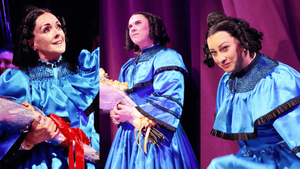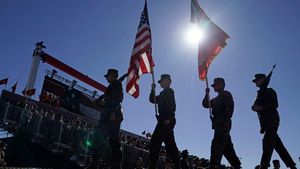CONTACTAbout UsCAREER OPPORTUNITIESADVERTISE WITH USPRIVACY POLICYPRIVACY PREFERENCESTERMS OF USELEGAL NOTICE
© 2025 Equal Entertainment LLC.
All Rights reserved
All Rights reserved
By continuing to use our site, you agree to our Privacy Policy and Terms of Use.
We need your help
Your support makes The Advocate's original LGBTQ+ reporting possible. Become a member today to help us continue this work.
Your support makes The Advocate's original LGBTQ+ reporting possible. Become a member today to help us continue this work.
"In her kiss, I taste the revolution!"
So goes the ecstatic shriek at the pinnacle of Bikini Kill's punk girl-power anthem "Rebel Girl." Released at least three times between 1991 and 1994 -- including one version produced by Joan Jett -- the track was a fight song for Riot Grrrl, a punk feminist movement of young women that flourished across the United States, and in Canada and the U.K., in the early and mid '90s.
Riot Grrrl had its roots in the punk scenes of Olympia, Wash., and Washington, D.C. It spread first through the music of all- or mostly female bands based in these two towns, including Bikini Kill, Bratmobile, and Heavens to Betsy. (Kathleen Hanna, the lead singer of Bikini Kill, later went on to front the feminist electro-pop band Le Tigre; Heavens to Betsy's singer-guitarist, Corin Tucker, cofounded the power trio Sleater-Kinney.)
The movement was about far more than music, though. In the early '90s -- a time of Anita Hill and Tailhook, Rush Limbaugh and parental-consent abortion laws -- affronts against young women's dignity seemed endless. Riot Grrrl swiftly crystallized the anger and frustration of a whole generation of young women. Daughters of second-wave feminism, these girls had grown up on promises of equality that seemed to dissolve sometime around adolescence, when the endless opportunities allegedly available to girls in "postfeminist" America began running aground on the realities of constricting gender roles and beauty standards, sexual harassment and assault. These contradictions were enough to make a girl want to scream.
And once Riot Grrrl began, thousands upon thousands of girls did scream, in myriad ways. They picked up electric guitars and drumsticks for the first time. They organized meetings and festivals and conventions. They wrote handmade zines and built underground self-publishing networks to distribute one another's writing, art, music, and videos.
"Girl love" was one of the movement's key catchphrases, updating the lauded "sisterhood" of the '60s and '70s women's liberation movement into something more ambiguous. The sisterly bond is utterly desexualized, almost defensively so, but "girl love" leaves things open to interpretation: Is said love romantic or not? When you're 16, do you ever really know for sure?
Many riot grrrls considered themselves bi, at least in theory if not in practice, which helped the movement sidestep the gay-straight frictions that had riven feminist organizations in the 1970s and '80s. As Riot Grrrl chapters sprang up in cities and suburbs across the country, each group developed its own unique composition and energy. In Olympia, some lesbians at Evergreen State College considered the Riot Grrrl crowd's bi-with-a-boyfriend(-and-maybe-a-girlfriend-too) vibe to be too straight for them. In New York, though, the weekly Riot Grrrl meetings and regular concerts, art shows, and festivals acted as a magnet for queer young women.
Although none of Riot Grrrl's original progenitors identified as lesbians, the movement had taken much of its inspiration from the gay punk networks of the late '80s and early '90s. And by 1996, when all the bands originally associated with Riot Grrrl had broken up or were headed that way, the torch was passed to a new wave of specifically queer musicians: all-lesbian supergroup Team Dresch (who frequently toured with Bikini Kill in their early years), power-poppers the Butchies, avant-metal duos the Haggard and the Need.
Crucially, Riot Grrrl was always about resisting definition and defying categorization. In their zines, songs, and artwork, the girls insisted over and over on their right not to have everything figured out. The early and mid '90s saw a proliferation of "gay-straight alliance" clubs at high schools; but in those organizations that named their members as being either "gay" or "straight," and in the movements that posited explicit self-disclosure as a necessary basis for (and even as synonymous with) political action, there was little space for a teenage girl who was infuriated by homophobia but still in the process of making sense of her own sexuality -- a long, complex process for many people, especially adolescents. Riot Grrrl's declarations of indeterminacy, its adherents' refusal to be boiled down to one platform or identity: This is one of the movement's most important legacies.
Girls to the Front: The True Story of the Riot Grrrl Revolution, published by Harper Perennial, is out now.
From our Sponsors
Most Popular
Bizarre Epstein files reference to Trump, Putin, and oral sex with ‘Bubba’ draws scrutiny in Congress
November 14 2025 4:08 PM
True
Jeffrey Epstein’s brother says the ‘Bubba’ mentioned in Trump oral sex email is not Bill Clinton
November 16 2025 9:15 AM
True
Watch Now: Pride Today
Latest Stories
Texas expands lawsuits against doctors accused of providing gender-affirming care to youth
December 11 2025 4:36 PM
How Sundance 2026 celebrates its queer legacy
December 11 2025 3:54 PM
George Santos’s exclusive D.C. Christmas party featured famous grifters & MAGA influence peddlers
December 11 2025 3:31 PM
Nancy Mace investigated for bad behavior at airport, blames transgender people
December 11 2025 1:11 PM
Pete Buttigieg mocks Trump Transportation Secretary Sean Duffy’s strange airport pull-up stunt
December 11 2025 1:00 PM
Appeals court mulls upholding ruling that struck down Pentagon’s HIV enlistment ban
December 11 2025 11:51 AM
Florida sues leading medical groups for supporting gender-affirming care
December 11 2025 11:02 AM
Behind Marjorie Taylor Greene's latest push to criminalize gender-affirming care
December 10 2025 9:09 PM
Queer actor Wenne Alton Davis, known for 'Maisel,' 'Normal Heart,' killed in NYC car crash
December 10 2025 5:14 PM
‘Proud’ pro-LGBTQ+ Democrat flips Republican state House seat in Georgia electoral upset
December 10 2025 4:05 PM
Texas city votes to overturn LGBTQ+ antidiscrimination protections
December 10 2025 4:03 PM
Pornhub's spicy stats prove just how horny 2025 was
December 10 2025 3:30 PM
'Heated Rivalry' stars thank WeHo gay bar for 'tweeting about our butts'
December 10 2025 2:55 PM
Egypt and Iran tell FIFA to cancel World Cup Pride Match, calling it 'contrary' to values
December 10 2025 1:05 PM




































































Charlie Kirk DID say stoning gay people was the 'perfect law' — and these other heinous quotes